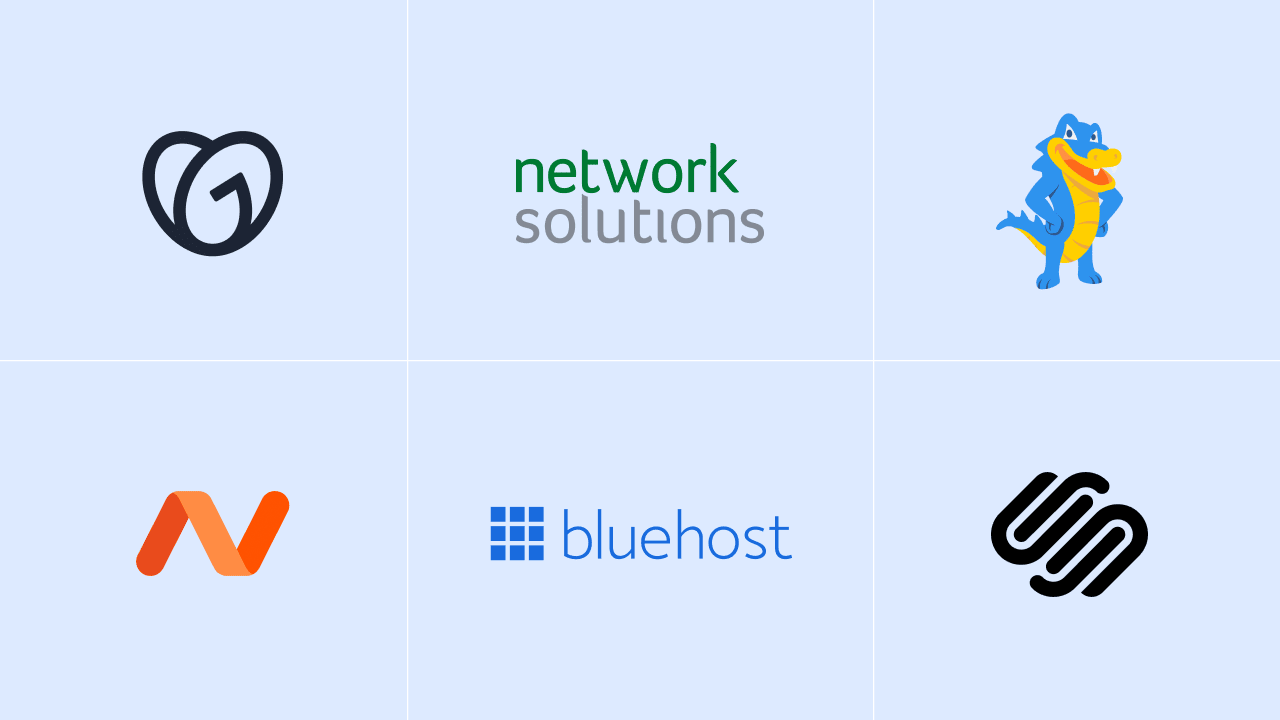Key takeaways:
- The best domain registrar gives you clear pricing, strong security, and easy renewals.
- Low prices aren’t always the best deal. Introductory offers can look appealing, but renewal rates and add-on fees often make the total cost higher than expected.
- Pick a provider that matches your technical comfort level and website goals—from features to support.
Buying a domain name should be easy, but some providers make it tricky. They tempt you with a cheap price at first, then add hidden renewal fees or extra costs for privacy and security.
Today, there are 371.7 million registered domains worldwide, and the number keeps climbing. With so many registrars to choose from, this guide highlights the best domain name providers in 2026 to help you choose the right one for your business.
But first, let’s look at the basics.
What is a domain registrar?
A domain registrar, often called a domain name provider, is the company that officially registers your domain name and provides the tools to connect it and run your website.
Registrars are accredited by ICANN, which oversees domain names and approves who can sell them.
Some companies, like hosting providers or resellers, also sell domains, but they may not give you the same level of control or support.
Your provider plays an important role in:
- Managing registrations, renewals and domain transfers
- Offering customer support
- Protecting your domain with WHOIS privacy and other security features
- Allowing you to update DNS records or make changes to your TLD
Curious about TLDs? Read our guide on what a TLD is so you can understand your options before picking.

Tip: Working with an ICANN-accredited registrar usually means more transparency, better control over your domain, and straightforward transfers. Third-party sellers may advertise a discounted price, but they often lack strong security services or consistent renewal processes.
How we developed this list
We know choosing a domain provider isn’t always easy. That’s why we built this list around the basics small business owners need most: clear pricing, helpful support, solid security, and a simple way to register your domain.
We also checked feedback from real users on trusted sites to see what other small business owners are saying, both the good and the bad.
Our aim here is to help you find registrars that balance cost, support, and reliability as your business grows.
Note: Deals and discounts change often, so it’s smart to double-check the provider’s site for the latest rates.
Best domain name providers for small businesses in 2026
We’ve rounded up the best domain providers in 2026, based on who they’re best for, starting price, privacy, and support. Each one serves a different type of user, so focus on the features that matter most for you.
| Platform | Pricing (starts at) | Key features | Best for |
| Network Solutions | $11.99/year (.com) | Over 400 domain extensions Easy domain lookup tool Bundled email, SSL, and hosting options 24/7 support | Small business owners Brands that want steady service and a trusted long-term partner |
| Namecheap | $6.49/year (.com) | Free domain privacy Straightforward pricing Regular discounts and promos SSL and email add-on | Budget-minded users Freelancers Small businesses |
| GoDaddy | $0.01 first yr (.com) w/ multi-year plan | Large ecosystem Domain auctions Bundled hosting/email/security 24/7 phone & chat | Small businesses Entrepreneurs wanting all-in-one growth options |
| Squarespace Domains | $14/year (.com) | Free WHOIS privacy and SSL Clean checkout with no ads Works directly with the Squarespace builder | Creatives Entrepreneurs who prefer a simple, bundled setup |
| IONOS | $1 first-year promo (.com) | Dedicated account advisor SSL and WHOIS privacy free for the first year Bundled hosting and email | Small businesses wanting low-cost domains plus personal support |
| Bluehost | $12.99/year (.com) | Free domain with hosting SSL/email options WordPress integration 24/7 support | Beginners launching sites with hosting and domain bundles |
| Porkbun | $11.08/year (.com) | Free domain privacy, SSL, and email forwarding Access to 500+ domain extensions DNSSEC and two-factor login protection included | Startups Small teams Price-sensitive users |
| Dynadot | $10.88/year (.com) | Bulk tools Free privacy Advanced DNS/APIs Domain marketplace | Domain investors Developers Bulk portfolio managers |
| Cloudflare Registrar | $9.15/year (.com) | Domains sold at wholesale cost Free privacy protection and SSL Built-in DDoS defense Global CDN services included | Developers Businesses that put security first |
| Hover | $18.99/year (.com) | Free WHOIS privacy 300+ domain extensions to choose from 2FA login Simple, ad-free checkout | Freelancers Solo entrepreneurs Small businesses looking for easy domain management |
Note: Prices are subject to change without prior notice. Please check the registrar’s official website for the most up-to-date rates.
Network Solutions

Network Solutions is one of the oldest domain registrars, originally founded in the 1970s and later becoming the first company to manage domain name registrations under .com, .net, and .org.
With Network Solutions, you can register a domain and bundle it with hosting, email, SSL, and marketing tools.
Small businesses like having everything they need in one place. The platform is designed for consistency and ease, that’s why it’s great for anyone who wants a long-term partner for their online needs.
Key unique features
- Wide domain selection with 400+ extensions, including niche TLDs like .tech, .store, and .xyz
- Easy domain registration with an AI-powered search tool that quickly checks availability and suggests smart alternatives
- Bundled services for email and web hosting, SSL, and site builders
- Dedicated support with 24/7 chat and phone, business consultants available Monday to Friday from 8 AM to 11 PM ET, and product support for setup and technical helps
- Security services and domain management backed by decades of experience
Who it’s best for
- Business owners who want everything in one place—domain, hosting, email, SSL, templates
- Users who prefer simpler tools over fancy design flexibility, such as a drag-and-drop site builder and basic templates
- Individuals who value reliability and long track record, especially for legitimate businesses that want stable support and less downtime
What users are saying
Business owners on Trustpilot highlight Network Solutions’ responsive and patient support. Reviewers mention that issues are resolved quickly and that staff guide them through each step until everything is fixed. Customers also value the platform’s reliability and stability, saying it makes domain management less of a hassle.
Some reviews, however, point out that renewal prices feel higher than expected and that the platform’s design could use an update to be a bit more modern.
Pricing and plans
| Plan | Cost / term | Plan inclusions |
| Domain Only | Included with domain | 1 free month of Starter Hosting Drag-and-drop builder, FTP tools, and open-source apps Option to forward to an existing website |
| Domain and Essential Hosting | $4.99 per month | 1 domain name 20 GB disk space 3 websites 1,000 email boxes Free SSL certificate (first year) |
| Domain and Premium Hosting | $6.99 per month | 1 domain name 40 GB disk space 10 websites Unlimited email boxes Free SSL certificate (first year) |
Note: Prices shown are current at the time of writing. Discounts and promotions, including a discounted price for the first year, may apply. Always confirm with Network Solutions for the most up-to-date offers.
Namecheap

Namecheap started the year 2000 and now manages more than 24 million domains. It’s built a reputation for affordable pricing and reliable security. And instead of pushing constant upsells, it offers straightforward rates with free domain privacy included. What you see is what you pay.
Key unique features
- Free privacy protection with most domains
- Intuitive dashboard that makes renewals and management less of a headache
- Extra services such as SSL, hosting, and business email if you need them later
Who it’s best for
- Budget-conscious users who want straightforward domain name registration, free privacy, and fewer upsells
- Freelancers, small businesses, and even developers who value simplicity over bundled platforms
What users are saying
Most customers like Namecheap because of its ease of use. Registering and managing a domain is straightforward, even without much technical knowledge. The support team is often praised for being quick to respond, and many small business owners appreciate the affordable pricing and generous first-year promos.
On the downside, some users were surprised by the higher renewal costs after the first year, which can be tough if you’re on a tight budget. A few also found auto-billing or domain expiration rules.
Still, most people feel that Namecheap gives good value for money and makes domain management less stressful.
Pricing and plans
| Plan | Cost / term | Plan inclusions |
| .com domains | $11.28 first year (intro rate) $18.48/year renewal | Free domain privacy |
| .net domains | $12.98 first year (starter deal $18.58/year renewal | Privacy protection included |
| .org domains | $7.48 first year (promo price) $15.98/year renewal | Free privacy feature |
| .io domains | $34.98 first year $66.98/year renewal | Lifetime privacy guard |
Note: Namecheap runs frequent promotions with attractive first year offers, but renewal fees are higher. It’s best to confirm on their site for the latest rates and deals.
GoDaddy
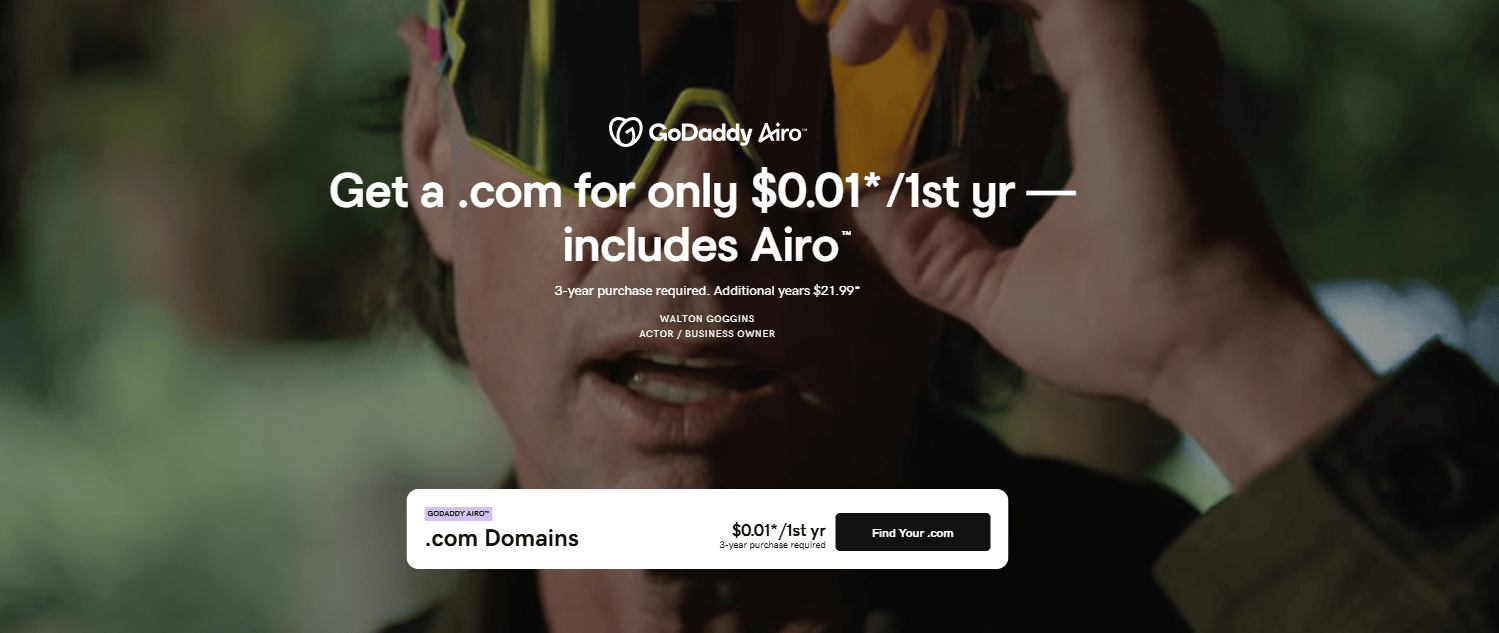
GoDaddy is widely recognized as a leader in domain registration, with over 84 million domains under management. Along with domains, you can get hosting, SSL certificates, site builders, and marketing tools all in one place.
Key unique features
- Always-on support with chat and phone help
- Integrated services that include domains, hosting, email, and security
- Domain auctions for premium and hard-to-find domain names
- SSL certificates and security add-ons for advanced protection
- Large ecosystem of tools that scale with your website, including marketing add-ons to help promote growth
Who it’s best for
- Small business owners who want an all-in-one platform without juggling multiple providers
- Entrepreneurs looking for room to scale their online presence as their business grows
- Anyone who prefers bundled services, from domains to hosting and security, in a single dashboard
What users are saying
Reviews on G2 often point to GoDaddy’s ease of use. Users like the uncluttered dashboard and the way the domain search suggests other names instantly. One customer shared, “GoDaddy’s domain management dashboard is clean and efficient. The domain search feature is quick, with real-time availability checks and suggestions for alternative extensions if my preferred name is taken.”
At the same time, some users point out that renewal prices can be higher than expected. Others mention that checkout includes too many upsells, which can feel overwhelming if you only want to buy a domain.
Pricing and plans
| Plan | Cost / term | Plan inclusions |
| .com domains (intro offer) | $0.01 for the first year (with multi-year plan) | Full domain registration + includes domain name search ability |
| Standard Renewal | Varies, usually above the introductory rate | Continued ownership of your domain Higher renewal fee applies |
| Free WHOIS Privacy Bundle | Built-into registration | Your personal info is shielded without extra charge |
Note: GoDaddy offers discounts in year one, but renewal fees can go up. Double-check their site for the latest rates before you buy.
Squarespace Domains

Squarespace Domains is built right into the Squarespace platform, so setup is fast and beginner-friendly. You don’t need technical skills to register a domain, and SSL plus domain privacy are automatically included. And that means no hidden add-ons at checkout.
Key unique features
- Free WHOIS privacy and SSL included with every domain to cut costs
- Beginner-friendly checkout that’s simple and ad-free
- Straightforward design and setup tools that suit creatives and small teams
- Step-by-step support resources designed for first-time users
- Simplified DNS management for those who want ease of use over advanced controls
Who it’s best for
- Freelancers, creatives, and entrepreneurs who want a minimalist, all-in-one setup without juggling multiple platforms
- Most people who value ease over customization, and don’t need complex internet management tools
What users are saying
Many users say Squarespace is great for people who aren’t tech experts. One reviewer said, “I like using Squarespace for our small charity. Our website is simple, and it’s really easy to edit and update as needed. I don’t need to use any code, which makes it even better”
One limitation, though, is that template layouts can’t be adjusted much. Some reviewers also point out that the price is higher than other starter platforms.
Pricing and plans
| Plan | Cost / term | Plan inclusions |
| Personal | $16 per month (annual billing) | Website builder Free custom domain (1st year) SSL security 24/7 support |
| Business | $23 per month (annual billing) | Everything in Personal + unlimited contributors Marketing integrations Premium blocks |
| Commerce Basic | $27 per month (annual billing) | Everything in Business + fully integrated ecommerce Checkout on your domain No transaction fees |
| Commerce Advanced | $49 per month (annual billing) | Everything in Commerce Basic + advanced shipping Subscriptions Abandoned cart recovery |
Note: Squarespace includes a free custom domain for the first year with annual billing. Pricing shown reflects annual plans; monthly billing is available at higher rates.
IONOS
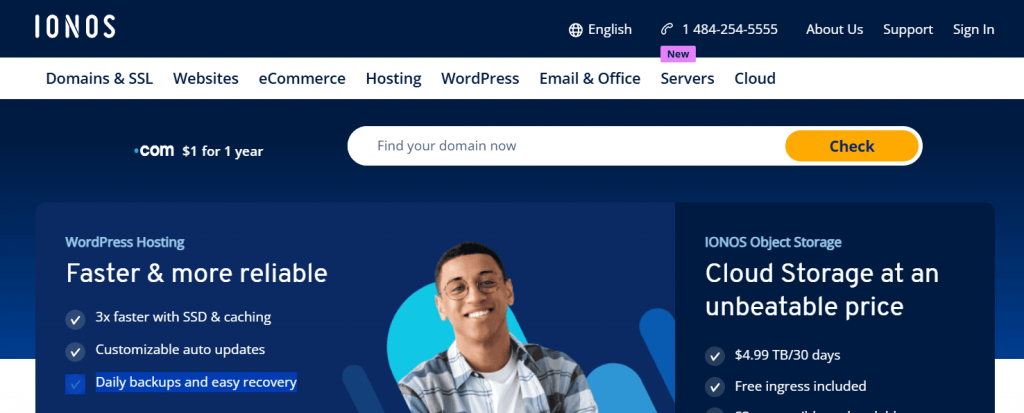
IONOS is a long-standing domain registrar and hosting company known for transparent pricing and hands-on support. It offers domain registration bundled with tools like email, site builders, and cloud hosting. Unlike many other providers, IONOS also emphasizes personal support through dedicated advisors.
Key unique features
- Personal advisor support for one-on-one help that gives businesses dedicated guidance
- Business-focused services bundled together, including domains, hosting, SSL certificates, and email
- Low first-year pricing for domain registration, with WHOIS privacy and SSL certificates free in year one
Who it’s best for
- Small businesses that want low-cost bundles with reliable support
- Users who need an easy start without technical hurdles but still want personal help available during the grace period of domain transfers or renewals
What users are saying
Many customers highlight IONOS for its friendly and patient customer support. They say the team takes time to walk them through issues and explain things clearly, which makes domain setup and management easier for people who aren’t very technical.
Users also appreciate that pricing details are listed upfront, and the first year offers give good value, especially since extras like SSL and privacy are often included. On the other hand, some reviews mention frustration with unexpected charges or account issues tied to add-ons and renewals. A few also feel the dashboard looks older or harder to use compared to newer providers.
Pricing and plans
| Plan | Cost / term | Plan inclusions |
| Intro offers | As low as $1 for the first year with promos | Limited to select domain extensions |
| Standard domains | $17–$25 per year | Popular extensions like .com, .net, .info, and others |
| Premium extensions | Up to $200 per year | Specialty names such as .ai or .casino |
| Renewals | Price varies after the first year | Renewal rates are higher unless you lock in with a multi-year deal |
| Extras | May include free features | Email storage or privacy tools on select plans |
Note: IONOS frequently runs introductory deals, but long-term costs depend on the TLD and renewal terms.
Bluehost
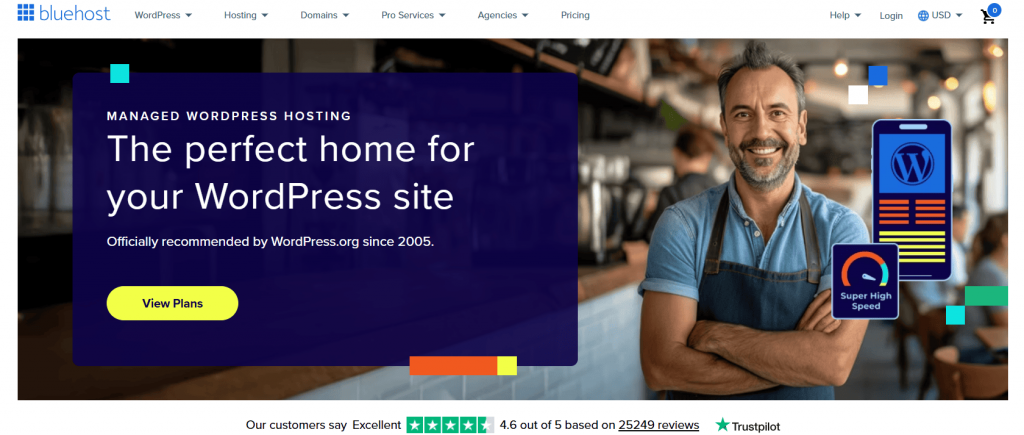
Bluehost is a well-known domain registrar and hosting provider, officially recommended by WordPress.org. Its main strength is simplicity: beginners can handle domain registration, hosting, SSL, and backups under one login. That makes it especially appealing for first-time site owners who want fewer moving parts to manage.
Key unique features
- Free domain for the first year with most hosting plans
- 24/7 support with setup help by phone and chat
- Built-in WordPress integration with hosting and SSL for easy site building
- Domain management tools for registration, DNS edits, and transfers
- Consolidated services with hosting, SSL, and domain management in one place
Who it’s best for
- Beginners who want to register a domain and launch a full website quickly
- Users who prefer bundled services that reduce complexity
What users are saying
Many people say Bluehost offers good value for beginners. They like that it’s affordable, has useful features, and works well with WordPress. One user notes that it “is very affordable and you get good basic features for keeping track of the sites.”
Support gets mixed reviews, though. Some users say Bluehost’s support team helps quickly and clearly when things go right; others say it takes too long to get issues resolved or that navigating certain parts (like DNS settings) can be confusing.
Pricing and plans
| Plan | Cost / term | Plan inclusions |
| Intro offers | $1.99 first year | Discounted pricing applies to select TLDs |
| Standard domains | $12.99–$18.99/year | Popular extensions like .com, .net, .org available |
| Premium extensions | Higher cost for niche domains | Options like .tech and .store |
| Privacy add-on | $11.88/year | Adds WHOIS privacy to keep your personal details hidden |
| Renewals | Renewal prices go up after the first year | Standard renewal rates apply |
Note: Bluehost’s core pricing is steady year to year, but extras like privacy and advanced security tools add to the overall cost.
Porkbun
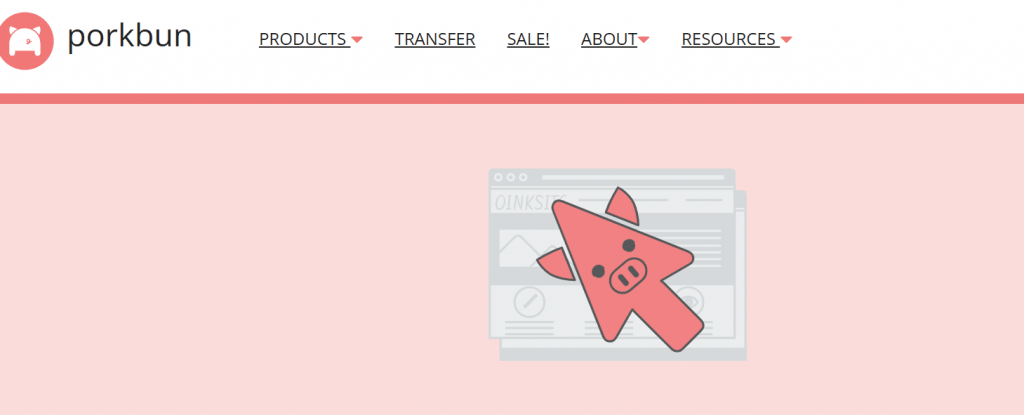
Porkbun is an ICANN-accredited domain registrar known for low prices and simple tools. Instead of pushing extras, it keeps domain registration clear and affordable, making it a solid choice for individuals, startups, and small teams. With more than 500 TLDs available, it lets businesses pick domain extensions that match their brand and audience.
Key unique features
- Flat pricing with no hidden renewal hikes
- Free extras include WHOIS privacy, SSL, and email forwarding
- Broad TLD access with over 500 domain extensions available
- Beginner-friendly dashboard with a bulk search tool for up to 100 domain names
- Strong security through DNSSEC, domain lock, and 2FA at no extra cost
Who it’s best for
- Cost-conscious users, startups, and small teams who want affordable domain names without upsells
- People managing multiple domains with bulk search and simple tools
What users are saying
Most users like Porkbun for its low prices and free extras such as WHOIS privacy, SSL, and email forwarding. They also say the setup is quick and customer support is responsive. People managing several domains find the bulk search tool useful, too. But some note that the interface looks a bit dated and that beginners may not get much step-by-step guidance.
Pricing and plans
| Plan / domain type | Cost / term | Plan inclusions |
| .com domains | $7.98 for the first year $11.08 per year on renewal | Standard registration for business and personal use |
| Premium domains | Pricing varies, often starts at $50+ per year | Specialty extensions such as .ai and other niche TLDs |
| Included features | Free with registration | Free WHOIS privacy Free SSL Free email forwarding |
| Intro offers | Discounted first-year price with promos | Extension-specific offer only |
Note: Porkbun is known for transparent renewal costs and bundles privacy, SSL, and forwarding at no added charge.
Dynadot
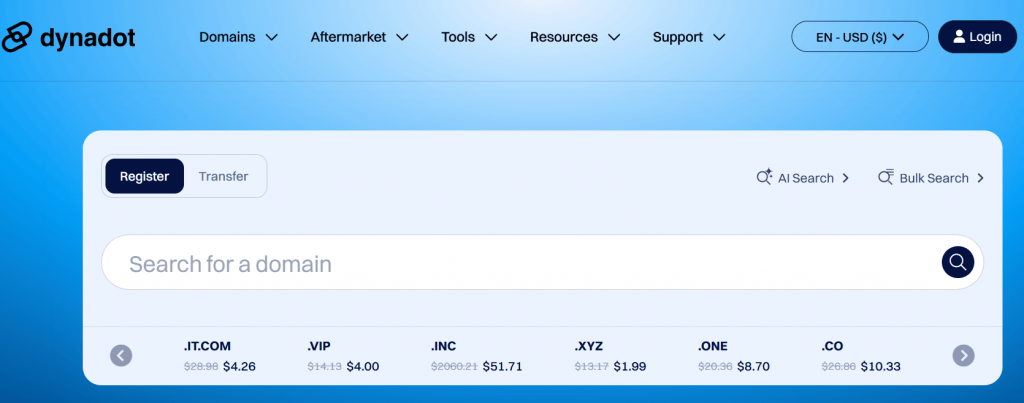
Dynadot is a developer-friendly domain registrar. Designed for customers who want precision and control, it offers bulk tools, APIs, advanced DNS, and transparent pricing.
Dynadot also has a marketplace where users can buy and sell domains. With over 700 extensions to choose from, it gives domain investors more options and flexibility for managing multiple sites.
Key unique features
- Portfolio view that displays all your domains together for easy tracking
- Domain marketplace built in for buying and selling domains directly
- Free WHOIS privacy with transparent upfront pricing and no hidden renewal hikes
- Global coverage with support for over 700 TLDs
Who it’s best for
- Developers, resellers, and power users who need advanced domain tools and transparent pricing
- Customers who want to manage or sell domains at scale
What users are saying
Many users praise Dynadot for having clear, upfront pricing with no hidden fees, especially on new registrations and renewals. They often mention that when transferring domains or buying new ones, things go smoothly, and the site is reliable.
People also like that Dynadot offers lots of TLD choices and that customer support tends to be fast and helpful.
On the flip side, some say the dashboard feels more technical than friendly, especially for beginners. A few also mention that service features like domain transfers have conditions (e.g. lock-periods) that can be frustrating if you manage many domains.
Pricing and plans
| Plan / domain type | Cost / term | Plan inclusions |
| .com domains | $10.88 first year $10.88 renewal $10.88 transfer | Standard registration for personal and business use |
| .info domains | $2.50 first year $20.55 renewal | Affordable entry with higher renewal pricing |
| .us domains | $3.80 first year $6.96 renewal | Localized domain option for U.S. presence |
| .one domains | $8.70 first year $20.55 renewal | Alternative extension with low entry cost |
| Bulk / Superbulk perks | Varies | Discounts and bonus features for high-volume domain buyers, including: Bulk tools Priority support |
| Free included features | Included at no extra cost | Free WHOIS privacy Free custom email address DNS management Domain forwarding |
Note: Dynadot provides transparent pricing with clear registration and renewal rates. First-year offers and premium TLDs can vary widely, so it’s best to double-check current prices before you register.
Cloudflare

Cloudflare is a domain registrar and DNS provider known for its security-first approach. It sells domains at wholesale cost, meaning no markup, which makes it one of the cheapest options for long-term domain registration. It pairs affordability with strong DDoS protection, SSL, and a global CDN that boosts website performance and resilience. However, the user interface can feel overwhelming for beginners, and support is limited if you stick to the free plan.
Key unique features
- At-cost pricing on domains (around $9–$10 per year) with no renewal hikes or hidden upsells
- Free WHOIS privacy and SSL certificates included with all registrations
- Strong security tools such as DNSSEC, DDoS protection, and domain lock
- Advanced DNS management with bulk transfers and API access
Who it’s best for
- Developers and security-focused businesses that want affordable domains with built-in protections
- Less suited for beginners who prefer hands-on customer support or a simpler dashboard
What users are saying
Many users praise Cloudflare for making both security and speed work together. The CDN, SSL, and DDoS protection often get called out as doing their job well. One user said, “Cloudflare offers a seamless blend of security and performance enhancement features. The WAF … is constantly updated … I especially appreciate the ease of DNS management and the intuitive dashboard.”
Customers appreciate that the initial setup is relatively smooth even for people who aren’t networking experts. Changes like DNS updates or security rule additions usually show almost immediately.
Pricing and plans
| Plan / domain type | Cost / term | Plan inclusions |
| .com domains | Around $9.15 per year | Sold at wholesale cost with no markup |
| Other extensions | Varies by TLD | Domains like .net and .co offered at transparent rates |
| Renewals | Same as registration cost | No first-year discounts; pricing remains steady year to year |
| Included features | Free WHOIS privacy and SSL Email forwarding included | Advanced firewall and security add-ons available at extra cost |
Note: Cloudflare sells domains for the same price it pays the registry. There’s no extra markup, so renewals stay steady, but you won’t see first-year promo deals.
Hover

Hover is a Canadian domain registrar under Tucows, a company with decades of experience in the internet market. Unlike many registrars that push hosting or website builders, Hover focuses purely on domain registration. This streamlined approach makes it appealing for users who want a straightforward way to register domains without being pushed into extras.
Key unique features
- Lifetime WHOIS privacy included for as long as you own the domain
- Simple search tool that makes it easy to browse 300+ extensions
- Added security with two-factor login protection
- Free domain transfers from other registrars
Who its best for
- Individuals, freelancers, and small businesses that want a simple, reliable registrar
- Customers who value privacy and straightforward management without bundled extras
What users are saying
Hover customers often mention how easy it is to register and manage domains without being pushed into extras. Many like the clean dashboard and the straightforward checkout that avoids upsells. A user on G2 shared that Hover’s platform “makes managing domains easy and intuitive,” pointing out that it works well for people who just want a reliable registrar without extra clutter.
Pricing and plans
| Plan / domain type | Cost / term | Plan inclusions |
| .com domains | About $18.99 per year | Renewal rates remain steady across years |
| Premium domains | $30–$60 annually | Extensions like .io or .app available |
| Included features | Free WHOIS privacy on supported domains | Renewal discounts when managing 10+ domains |
Note: Hover’s base pricing is slightly higher than some competitors, but steady renewals and bundled privacy make it a stable long-term choice.
How to choose the best domain provider
A good domain registrar helps you register, manage, and renew domain names smoothly. Besides price, look at features that protect your website and support long-term growth, and here are what you need to check before deciding:
- Transparent pricing. Look for clear upfront costs. Some companies promote a low first-year rate but hide renewal terms until checkout.
- Renewal terms. Read the fine print about how long your domain lasts and what happens when it expires. The best domain registrar will give you easy auto-renewal options and grace periods to avoid losing traffic.
- Customer support. When something goes wrong, you’ll want fast help. Check if the registrar offers 24/7 chat, phone, or email so customers aren’t left stranded.
- Privacy protection. WHOIS privacy keeps your contact details out of public records. Some registrars include it for free, while others add a fee.
- Domain transfer policies. A good provider should let you move your domain to another registrar without hassle or restrictions.
- Security features. Good registrars offer safeguards like DNSSEC, which uses cryptographic signatures to stop spoofing, plus registry locks that block unauthorized transfers. These tools help protect your website and brand.
- TLD support. Not all registrars sell every extension. Check if your preferred top-level domain (.com, .org, .ai, etc.) is available before you commit.
- Other services. Some registrars also bundle email, hosting, or SSL certificates. If you want more than domains, compare how these services fit into your market and growth goals.
Pro tip: Don’t focus only on discounts. Balance cost, features, and support. The right registrar prevents headaches and helps your site connect with visitors and customers.
Common mistakes to avoid
Small choices when registering or managing domain names can cause big problems later. These are common mistakes customers make, so avoid them to protect your website, traffic, and brand over time.
- Not choosing an ICANN-accredited provider. It may seem harmless, but non-accredited registrars often lack proper support or controls. Your domain(s) is safer with a registrar that follows standard policy.
- Overlooking renewal cost and extra fees. Many domain registrars offer a cheap first year, then hike up the cost. Always compare full cost, not just the intro price.
- Skipping WHOIS privacy or basic security. If a provider doesn’t include WHOIS privacy, or features like DNSSEC or domain lock, your domain names are more exposed.
- Picking a domain that’s too long, too complex, or hard to spell. Short, memorable domains make it easier for people to find you and share you.
- Ignoring future growth and branding limits. If your website/company grows or diversifies, the domain should still match. Pick one that gives you room to expand.
- Forgetting to check supported TLDs and domain history. Not all registrars offer all extensions. Also, a domain that was misused before (spam, link problems) can cause issues.
- Getting ahead of yourself. Rushing into registering without checking trademark conflicts, social media handles, or SEO implications can cost more later.
Avoiding these issues can save you money and reduce stress as your website grows.
Frequently asked questions
Registering a domain means locking in your own web address, like myshop.com. It works like a rental that gives you the exclusive right to use the name without buying it outright. This right usually lasts for a year, with the option to renew. Once registered, the domain gives your website a recognizable identity and links it to an IP address so people can find your site easily.
Registering a domain name usually costs around $10 to $25 per year through a domain registrar, with the price depending on the extension you choose (like .com, .org, or .net). Some providers offer first-year promos that drop the cost below $5, while premium names in high demand can run into the hundreds or even thousands. The total can also go up if you add advanced features like extra security or privacy.
Yes. Many providers offer both, so you can keep your domain and hosting in one account. This setup makes billing and renewals less of a hassle. Some even throw in extras like SSL certificates or email when you buy a domain. If you’re just starting, having everything in one package is easier than juggling different services.
Yes, it can. A domain change means search engines must re-check your site, which often causes a dip in SEO and link value. Redirects and DNS updates can ease the effect.
If you don’t renew your domain, your website and email tied to it will stop working, and you’ll lose control of the name. Most domain registrars provide a short grace period to renew at the standard price, followed by a redemption phase with higher fees. If it’s still not renewed, the domain may be auctioned or released back to the public for anyone to register.
Get the best out of your provider
The right registrar is the one that matches what you need. Providers have different strengths, so pay attention to the parts that matter most for you. That could be clear pricing with no hidden fees, privacy protection already included, or customer support that responds when you actually need help.
Choosing an ICANN-accredited registrar also gives peace of mind since your domain is recognized and secure. You can always begin with just the domain, then add hosting or email later if you decide you need them.
So, do you already have a domain name in mind?
